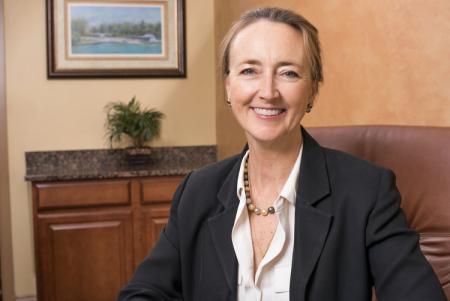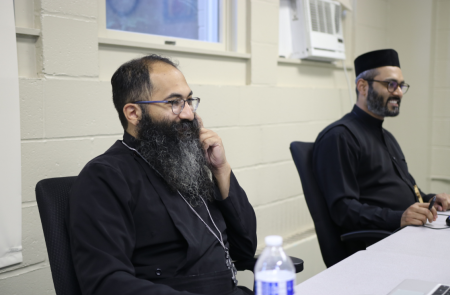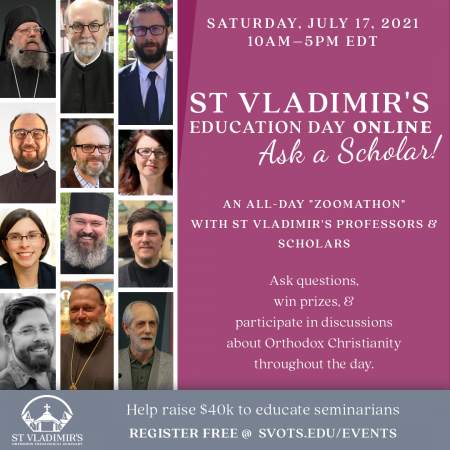Divine Liturgy
St. Vladimir
St. Vladimir
All Saints of North America

Anne van den Berg is an attorney at the law firm of Marchena and Graham, P.A. in Orlando, FL. Born in Paris, France, Anne and her husband Egerton, a board-certified cardiologist with Orlando Health Heart & Vascular Institute, have lived in Central Florida since 1989. Their growing family includes six children and three young grandchildren, and they are active in their OCA parish, St. Stephen the Protomartyr in Orlando/Longwood.
For nearly twenty-five years, Anne served as a St. Vladimir’s Seminary trustee, chairing the Advancement and Trusteeship Committees and contributing her expertise within the Legal Affairs Committee. When she retired from the Board in 2015, Seminary President Fr. Chad Hatfield commended her “for bringing her professional and legal perspective to our SVOTS Board.”
One of Anne’s law practice concentrations is in the area of wills and trusts, and in our Zoom conversation we spoke about how she has established a planned gift to St. Vladimir’s Seminary through the Father Alexander Schmemann Legacy Society.

The newest Doctor of Ministry (D.Min.) Cohort has been together for nearly a year without being able to meet in person. That changed this month. Members of the Cohort of 2023—who held their first intensive last fall via Zoom due to the pandemic—arrived on campus for their onsite intensive component July 12 through 16, 2021.
“It has been a blessing to be a part of the D.Min. program at St. Vladimir’s. Within a short time it has already enhanced my ministry a great deal,” said Fr. Sean Govostes, who serves at St. Katherine Greek Orthodox Church in Burlington, NC. “Being on campus for intensive week was very fruitful and beneficial for the entire cohort, if I may speak for us all. I would recommend the program to any priest who desires to better himself and enhance his parish.”
Joining Fr. Sean and the other D.Min. students on campus were Seminary professors Very Rev. Dr. Nicholas Solak and Dr. Ana Iltis. They taught Counseling in the Parish and Bioethics for Ministry, respectively. Professor Iltis is part of a group of noted professors who recently joined the D.Min. program, and the onsite intensive this month marked her first official visit to St. Vladimir’s in a teaching capacity.
“The onsite intensive lived up to its name in every way,” said Dr. Iltis. “Students and faculty were able to gather onsite at the seminary, and we enjoyed an intense week of exploring many of the ways bioethics issues relate to ministry.
“Witnessing the deep commitment the D.Min. students to advance their ministry was inspiring.”
The Cohort of 2023, the fourth that has formed since the D.Min. program was revived in 2014, was originally comprised of ten students from six different jurisdictions and denominations. Due to pandemic-related and other circumstances, a few students had to take leave from the program over the past year. The remaining students of the 2023 cohort are all priests who serve in parish ministry.
The D.Min. program at St. Vladimir’s Seminary provides priests, chaplains, and other pastoral professionals with advanced knowledge and skills. The program’s hybrid format allows students to continue serving in their current pastoral ministry while completing their D.Min. degree. For more information about the D.Min. program at St. Vladimir’s, contact Program Director Very Rev. Dr. Sergius Halvorsen at shalvorsen@svots.edu.
Are the Old and New Testaments in conflict? How do Orthodox Christians respond to matters of bioethics in a secular age? What is the future of Orthodox evangelism? Ask a scholar! Tackle these questions and others on a variety of topics during St. Vladimir's Education Day Online, a seven-hour “Zoomathon” where you get to participate and pose questions to Seminary professors and guest scholars.

The St. Vladimir’s Education Day Online—in celebration of the Feast of Holy Great Prince Vladimir—is Saturday, July 17 from 10 a.m. to 5 p.m. EDT (7 a.m. to 2 p.m. PDT). Participate in discussions and win prizes. Join the Zoomathon when a topic that interests you is scheduled, or join several discussions throughout the day. It's up to you when you join and for how long. (See the complete schedule below.)
Join us and help raise $40,000 to educate seminarians! Attendance is FREE. Please consider making a donation as you register or during the event. (If donating through our Giving Page, please select "St. Vladimir's Education Day Online" in the I want to support menu.)
You may submit questions now, as you register, to be asked during the event on July 17 (please indicate what topic your question belongs to in the comment box). Of course, you will be able to ask questions live during the event as well.
Faculty members from St. Vladimir’s Seminary will be joined by Seminary Alumnus Archbishop Alexander (Golitzin) and SVS Press author Archpriest Joseph Huneycutt. See below for a complete list along with a schedule of topics for the day.
|
TIME (EDT) |
TOPIC |
SCHOLARS |
|
10am |
Welcome & Opening Remarks |
|
|
10:15am |
Theophaneia: Forum on the Jewish Roots |
|
|
11:15am |
The Legacy of Fr. Alexander Schmemann |
|
|
12:05pm |
Orthodoxy After Communism |
|
|
1:05pm |
An Orthodox Response to Secularism: How Orthodox Christians respond to matters of bioethics in a culture "after God". |
|
|
2:05pm |
The Relationship of the Old & New Testaments |
|
|
3:05pm |
COVID-19 & Orthodox Seekers |
Very Rev. Dr. Chad Hatfield |
|
4:05pm |
Creativity & Holiness |
|
|
5pm |
Closing Remarks |